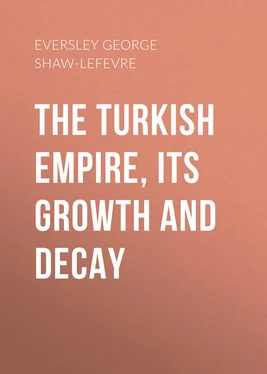George Eversley - The Turkish Empire, its Growth and Decay
Здесь есть возможность читать онлайн «George Eversley - The Turkish Empire, its Growth and Decay» — ознакомительный отрывок электронной книги совершенно бесплатно, а после прочтения отрывка купить полную версию. В некоторых случаях можно слушать аудио, скачать через торрент в формате fb2 и присутствует краткое содержание. Жанр: foreign_antique, foreign_prose, на английском языке. Описание произведения, (предисловие) а так же отзывы посетителей доступны на портале библиотеки ЛибКат.
- Название:The Turkish Empire, its Growth and Decay
- Автор:
- Жанр:
- Год:неизвестен
- ISBN:нет данных
- Рейтинг книги:3 / 5. Голосов: 1
-
Избранное:Добавить в избранное
- Отзывы:
-
Ваша оценка:
- 60
- 1
- 2
- 3
- 4
- 5
The Turkish Empire, its Growth and Decay: краткое содержание, описание и аннотация
Предлагаем к чтению аннотацию, описание, краткое содержание или предисловие (зависит от того, что написал сам автор книги «The Turkish Empire, its Growth and Decay»). Если вы не нашли необходимую информацию о книге — напишите в комментариях, мы постараемся отыскать её.
The Turkish Empire, its Growth and Decay — читать онлайн ознакомительный отрывок
Ниже представлен текст книги, разбитый по страницам. Система сохранения места последней прочитанной страницы, позволяет с удобством читать онлайн бесплатно книгу «The Turkish Empire, its Growth and Decay», без необходимости каждый раз заново искать на чём Вы остановились. Поставьте закладку, и сможете в любой момент перейти на страницу, на которой закончили чтение.
Интервал:
Закладка:
It had always been held the duty of a citizen to be ready to die either for his faith, his country, his sovereign, or his wife and children. All these incentives to heroic sacrifice were now combined. The city was the refuge for all Christians, the pride and joy of every Greek, and of all who lived in Eastern lands. It was the Queen of Cities, the city which, in happy times, had subdued nearly all the lands under the sun. The enemy coveted it as his chief prize. He had provoked the war. He had violated all his engagements in order to obtain it. He wished to put the citizens under his yoke, to take them as slaves, to convert the holy churches, where the divine Trinity was adored and the most holy Godhead worshipped, into shrines for his blasphemy, and to put the false prophet in the place of Christ. As brothers and fellow-soldiers it was their duty to fight bravely in the defence of all that was dear to them, to remember that they were the descendants of the heroes of ancient Greece and Rome, and so conduct themselves that their memory should be as fragrant in the future as that of their ancestors… For himself, he was determined to die in its defence… He and they should put their trust in God, and not, as did their enemy, in the multitude of his hordes.
In the evening a solemn service was held at St. Sophia, memorable as the last Christian service before its conversion into a Turkish mosque. The Emperor and his followers partook of the Sacrament and bade farewell to the Greek Patriarch. It was a memorable scene – a requiem service for the Empire which was about to expire. Later the Emperor paid a last visit to his palace and bade farewell there to its staff. It was a most touching occasion. One who was present there wrote of it: “If a man had been made of wood or stone, he must have wept at the scene.” It is very certain that the Emperor had no hope of saving the city from capture by its mortal foes.
Very early in the morning of the next fateful day, the 29th May, 1453, the final assault was delivered by the Turkish army. The scheme of the Sultan was to attack the walls of the city at many points, from both land and sea, but to make the main assault on the part of the wall which had been so much injured by the cannon in the Lycus Valley, near the gate of St. Romanus, and then, by successive waves of his vastly greater army, to overwhelm the defenders, using first his inferior troops, and reserving his best for the last attack, when the enemy would be wearied by long fighting. The first assault was made by an immense horde of irregulars, armed with bows and arrows, and with slings throwing stones and iron balls. Gunpowder, though already used for cannon, was not yet applied to muskets. The men advanced with scaling-ladders for the assault, and a cloud of arrows darkened the sky. No more than two thousand Greeks could be spared to defend this part of the long line of fortifications. They were collected in the peribolus between the two walls. The gates in the inner wall were closed, so that these men had no opportunity of shirking the defence and retreating into the city. They had to fight for their very lives between the two walls.
The Sultan directed the great cannon to be brought to the edge of the fosse, and a shot from it broke down the stockade which had been erected in place of the outer wall. Under cover of the dust the Turks made the assault. They were bravely met by the defenders, and were driven back with heavy loss. A second assault was then made by the Anatolian infantry, a very superior force to the irregulars. But they were no more successful. The Sultan, thinking that the Greeks must be exhausted by these two assaults, then personally led a third great body of men to a third assault. It consisted of his Janissaries. He led them to the edge of the fosse, and thence directed their attack. The cannon was used again against the stockade, and again under cover of the dust caused by it the Janissaries made their assault. Some of them succeeded in getting over the stockade, and a hand-to-hand fight occurred between them and the Greeks. The defenders seemed to have the best of it. But at this crisis a grave misfortune occurred to the Greeks. Giustiniani, who commanded them, was severely wounded. Blood flowed freely from his wounds. He decided to leave the field of battle and return to his ship in the harbour, for medical relief. The Emperor Constantine, who was near by, in vain implored him to remain, pointing out to him the damaging effect his departure would have on the soldiers who remained. Others thought that the wounds were not very serious and that the general was not justified in leaving the field. But he insisted on doing so, and demanded the key of the gate in the inner wall. With him departed some of his Genoese soldiers. This defection caused dismay and depression among the troops. Their resistance to the Turks slackened.
Some Greek historians accuse Giustiniani of cowardice in deserting the battle at so critical a moment, and Gibbon lends the weight of his great authority to this. The reputation, however, of the famous Italian soldier has been vindicated by later historians, such as Mr. Finlay and Sir Edwin Pears. They have shown that Giustiniani died of his wounds within a few days of the capture of Constantinople, the best proof of their serious and fatal character. All the same, he may not have sufficiently appreciated the effect of his withdrawal on the soldiers. It might have been better to have died there rather than on board his ship. However that might have been, all are agreed that the departure of the general was the turning-point of the day, and that it had the worst effect on the soldiers engaged in the defence.
The Emperor did his utmost to retrieve the position. He took upon himself the charge vacated by Giustiniani, and led the defence. Mahomet, on his part, had observed from the other side of the fosse the slackening of the defence. He called out to the Janissaries: “We have the city! It is ours! The wall is undefended!” He urged them to a final effort. They rushed the stockade and effected an entry into the peribolus . Soon great swarms of others followed, and overwhelmed the defenders with their vast numbers. The Emperor, despairing of success, threw aside his imperial mantle. He called out, “The city is taken and I am still alive!” Drawing his sword, he threw himself into the mêlée. He died fighting gloriously for his city and his Empire. His body was never found, though search was made for it by order of the Sultan. The Greek and Italian soldiers in the peribolus were now completely outnumbered. There was no exit through the inner wall by which they could escape. They were in a trap between the two walls. They were massacred to a man. The Janissaries, having effected this, found no difficulty in making their way through the inner wall, which, as we have explained, was not defended owing to the want of men.
All attacks on other parts of the city were failures. This one alone succeeded. Victory here was due in part to the good generalship of Mahomet and to his indomitable persistency, and in part to the ill-fortune of the Greeks in the withdrawal of Giustiniani at the critical moment of the defence. The defenders of the city had nobly performed their duty. Their numbers were quite insufficient. They had received no adequate support from Western Europe, or even from the neighbouring Christian States. It is quite certain that a few thousand more soldiers would have saved the city. Thirty galleys sent by the Pope with reinforcements were on their way when the city fell. They had been detained at Scio by adverse wind. “Auxilium deus ipse negavit,” says the Greek historian.
When the Turks entered the city they began to massacre all the persons they met in the streets, without distinction of age or sex. But there was practically no resistance. There were no armed men left in the city. The population was cowed and panic-stricken, as well they might be in face of the overwhelming misfortune which now came upon them. After a short period of massacre the Turks turned their attention to the more practical business of looting and taking captives for sale. They effected this in a deliberate and systematic way. One great band of soldiers devoted themselves to plundering the palaces of the wealthy, another to the churches, and a third to the shops and smaller houses. Everything of value was gathered together for subsequent division among the soldiers. Of the inmates of the palaces and houses the older people were put to death; the stronger and younger of both sexes were carried off in bands as prisoners, bound together with ropes, with a view to ultimate sale as slaves.
Читать дальшеИнтервал:
Закладка:
Похожие книги на «The Turkish Empire, its Growth and Decay»
Представляем Вашему вниманию похожие книги на «The Turkish Empire, its Growth and Decay» списком для выбора. Мы отобрали схожую по названию и смыслу литературу в надежде предоставить читателям больше вариантов отыскать новые, интересные, ещё непрочитанные произведения.
Обсуждение, отзывы о книге «The Turkish Empire, its Growth and Decay» и просто собственные мнения читателей. Оставьте ваши комментарии, напишите, что Вы думаете о произведении, его смысле или главных героях. Укажите что конкретно понравилось, а что нет, и почему Вы так считаете.












